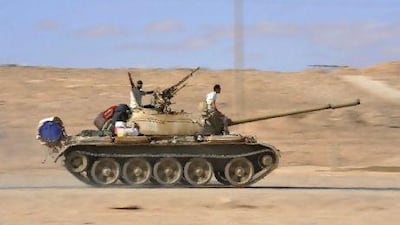AN NAWFALIYAH, Libya // Libyan rebels pledged yesterday to launch an attack within days on Muammar Qaddafi's hometown, the ousted Libyan leader's last major bastion of support.
The rebels and Nato said that Qaddafi loyalists were negotiating the fate of Sirte, a heavily militarised city some 400 kms east of Tripoli.
Mustafa Abdel Jalil, the head of the rebels' National Transitional Council, said that negotiations with forces in Sirte would end Saturday after the Muslim holiday of Eid Al Fitr, when the rebels would "act decisively and militarily."
"We can't wait more than that," he told reporters in Benghazi. "We seek and support any efforts to enter these places peacefully. At the end, it might be decided militarily. I hope it will not be the case."
As Mr Jalil spoke, columns of heavy artillery and lorries packed with rebel fighters streamed towards Sirte in anticipation of a fight that the anti-Qaddafi forces on the ground said could occur even sooner than the end of the Eid festival.
"We plan to have Eid inside the city of Sirte," said Hassan Ali Shaki, a 22-year-old insurgent, adding: "Even if we liberate Sirte, we will not be finished until we have the head of Qaddafi."
Col Roland Lavoie, a Nato spokesman, said it is possible Sirte might surrender without a fight.
"We have seen dialogues in several villages that were freed - I'm not saying with no hostilities, but with minimal hostilities," he said.
Col Lavoie said Nato would continue its mission as long as civilians in the country are under threat, although the area around Tripoli is now "essentially free."
The colonel appeared to struggle to explain how Nato strikes were protecting civilians at this stage in the conflict. Asked about Nato's assertion that it hit 22 armed vehicles near Sirte on Monday, he was unable to say how the vehicles were threatening civilians, or whether they were in motion or parked.
With or without Nato, the rebels were in a buoyant mood and appeared ready yesterday to take the fight to the former Libyan leader and whatever remains of his forces.
"Even if it takes another year, we're ready to fight for our freedom," said Mohammed Tafour, 24, an economics student at Benghazi University who has set aside his calculator for a gun.
The rebels continued yesterday to demanded that Algeria return Col Qaddafi's wife and three of his children for trial after they fled, raising tensions between the countries.
Safiya Qaddafi, her daughter Aisha and sons Hannibal and Mohammed entered Algeria on Monday, while Qaddafi and several other sons remain at large. In Washington, the Obama administration said it had no indication that Col Qaddafi himself had left the country.
Algeria's Health Ministry said that Aisha Qaddafi gave birth to a girl yesterday. The official provided no other information, including on where she gave birth. The official was not authorised to be publicly named according to ministry rules.
Algerian news reports had said Aisha's pending childbirth was one reason for Algeria's decision to take the family in.
Rebel leaders said they were not surprised to hear Algeria welcomed Col Qaddafi's family. Throughout Libya's six-month uprising, rebels have accused Algeria of providing the colonel with mercenaries to repress the revolt.
Col Qaddafi's children played important roles in the country's military and economic life. Hannibal headed the maritime transport company; Mohammed the national Olympic committee. Aisha, a lawyer, helped in the defence of toppled Iraqi dictator Saddam Hussein in the trial that led to his hanging.
* Additional reporting by The Associated Press

